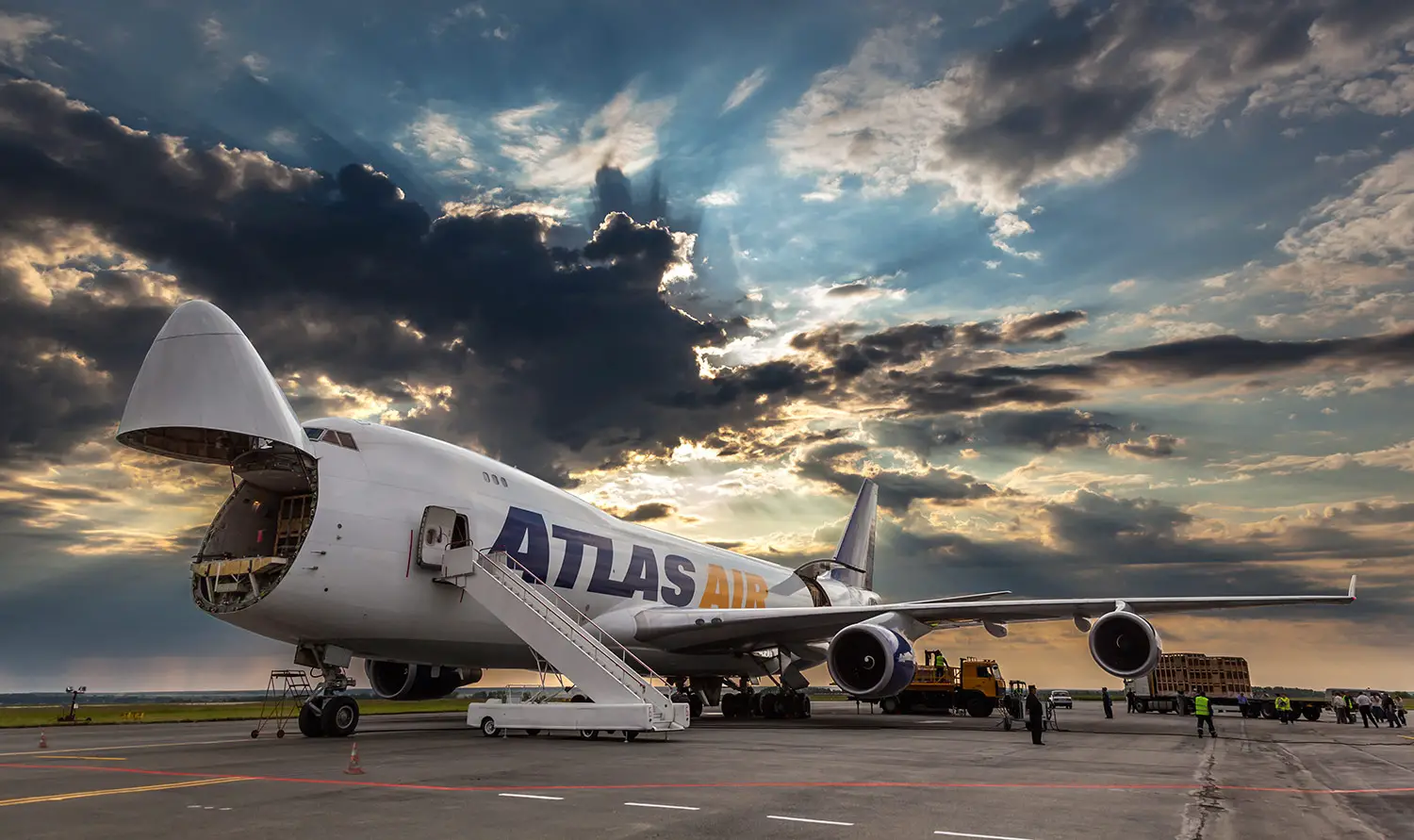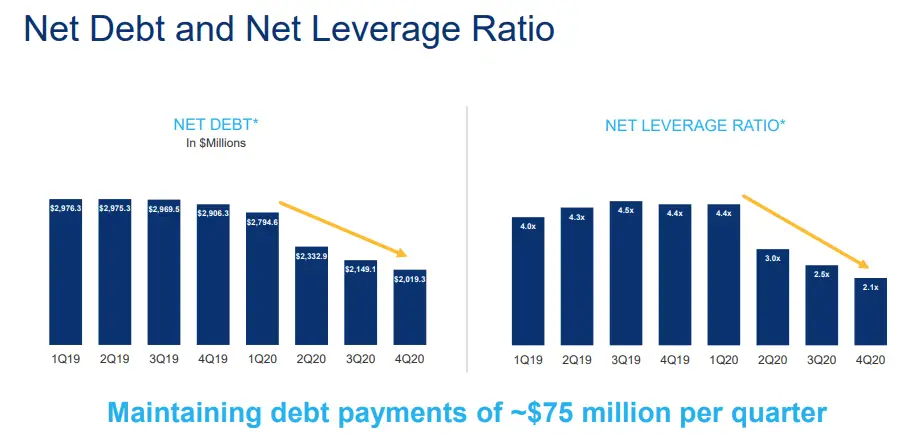Atlas Air Worldwide Holdings (NASDAQ: AAWW) is an interesting play in the airspace. Atlas Air focuses on three main segments, ACMI, charter, and dry leasing. ACMI stands for aircraft, crew, maintenance, and insurance. Essentially Atlas Airleases its aircraft and provides crew for other airlines. Dry leasing is a simpler form of leasing in which the lessee supports the costs of crew, insurance as well as all the fees associated with that aircraft.
Atlas Air charter segment is focused on freight cargo, although it also does passenger charter. It also offers CMI, essentially providing crew, insurance, and maintenance to any company or individual who requires this service.
Atlas Air’s customer base is made up of large corporations we all know, and even public entities like the US Department of Defense. Some of those include Boeing (NYSE: BA), Inditex (BME: ITX), FedEx (NYSE: FDX), UPS (NYSE: UPS), DHL along with very well known sports teams.
Given the challenging year of 2020, some airlines might prefer opting for ACMI or even dry leasing instead of hiring their crew and acquiring more aircraft. Although as we have seen recently Southwest Airlines (NYSE: LUV) has recently ordered 100 new aircraft.
4Q 2020 & Full-Year Results
Results in the last quarter of 2020 were very positive. Revenues grew ~25% YoY to $932.5M, which allowed AAWW to increase its net income to $184M. Adjusted EBITDA rose to $279.7M.Revenues for 2020 grew by over 17% when compared with 2019. It managed to increase its margins, and EBITDA grew by 67% to $844.2M.
Achieving an EPS of $13.5, which given the current stock price, translates into a price-to-earnings of 4.5. Free cash flow, which was negative in both 2018 and 2019, has surged to ~$750M. In part due to a higher than expected operating cash flow of over $1B. The CARES Act was crucial in helping boost AAWW’s liquidity.
CARES Act
AAWW received a total of $406.8M, in which $207M were cash grants, and $199.8M is in the form of a 10-year unsecured non-amortizing low-interest promissory note. The CARES Act allowed AAWW to strengthen its balance sheet, and present great results in 2020.
AAWW’s outstanding results in 2020 led some of the media to question the need for the funds provided by the CARES Act. Given that AAWW focuses on freight cargo, and some of the funds were aimed at helping passenger carriers there is some controversy surrounding the company.
The CEO, John Dietrich said during an earnings call that AAWW did not intend to return the funds. This has led some politicians to question the company publicly.
Atlas Air Debt
Management has taken advantage of the strong financial performance in 2020 to deleverage. Reducing net debt by ~$775M, and the net leverage ratio to 2.1x from 4.4x at the beginning of 2020.
Another determining factor for such a strong performance is the low oil prices in 2020. Another reason why AAWW was able to achieve such a stellar financial performance, is the fact that it is one of Amazon’s (NASDAQ: AMZN) contractors for freight charters.
Amazon
In 2016, Amazon and AAWW entered an agreement for cargo services. AAWW agreed to lease 20 Boeing 767 to Amazon. As part of the agreement, AAWW conceded Amazon with warrants to acquire up to 30% of the company for $37.5 a share.
Amazon has exercised the warrants since the shares are trading at a higher price. Nonetheless, it has sold most of the shares and maintains a stake of under 5%. 2020 was a terrible year for airlines in general but Amazon Air took the opportunity to expand its fleet. This in turn puts some pressure on AAWW, as Amazon represents a considerable amount of revenue and earnings.
Atlas Air Tailwinds
Reopening or Potential Lockdown
With the vaccine rollout and the economy reopening, some airlines might want to opt for leasing services. That could help boost AAWW’s leasing segments and passenger charter. As we have seen, AAWW seems to thrive even with the lockdowns in place. Its strong freight charter segment will see some growth if we return to lockdown.
E-Commerce & Amazon
E-commerce growth is a major tailwind for AAWW, whose services are directly connected. Its freight charter services will benefit going forward, as 35% of total world trade is done by airfreight. Any extension to the current agreements with Amazon or a potential new leasing deal could greatly benefit the company, and send AAWW stock soaring.
Atlas Air Valuation
Atlas Air has a market cap of ~$1.76B and it is trading at a price-to-earnings of ~4.5. Despite the challenging 2020 for most airline companies, AAWW managed to achieve strong financial performance. The stock is trading at an extremely low valuation. If we take into account the EBITDA of 2020, it represents ~48% of the market cap. AAWW is trading at a little over 2x 2020 EBITDA. It holds ~$856M in cash and cash equivalents, around 50% of the market cap.
Atlas Air still holds a considerable amount of debt ~$2.8B, net debt is ~$2B. With current price-to-earnings of ~4.5, trading at 0.75x book value and 0.55x sales. This is your typical Ben Graham value stock.
Guidance for the 1Q21 is lower compared with 4Q20, with revenue expected to be ~$820M and Adj. EBITDA of ~$150M. Net income is projected to be ~$30M. Bear in mind that the first quarter of the year tends to be AAWW’s weakest quarter.
Atlas Air Risks
AAWW is not your typical airline stock, the company has different revenue segments, and it seems well diversified. Nonetheless, investments in this type of company strike me as overly risky most of the time. Essentially it owns a bunch of depreciating assets, airplanes, so it is sometimes hard to calculate the value of its assets. On the other hand, any impactful changes might affect the efficiency of its operations, and reduce its margins.
Oil Price
The recent surge in oil prices can materially affect AAWW’s margins and profitability. Although it is difficult to predict how the oil market will fluctuate, Atlas Air is well hedged in that regard. Oil prices are one of the major influences on AAWW’s financial performance.
Amazon
Any changes or alterations to the agreement AAWW has with Amazon could put a lot of pressure on the company. This will certainly affect the stock price. The initial agreement made in 2016, which included 20 freight carriers initially has since been reduced to 19. The deal was made for a period of seven to ten years, which should end around 2023 to 2026. The second agreement for another five freight carriers was signed in 2019, and it is in place for seven to ten years. Potentially ending around 2026 to 2029.
Pilot Negotiation
AAWW has been dragging the negotiations with its unionized pilots for five years. The pilots demand new contracts with improved conditions. The pilot union estimates that this has cost AAWW around $1.4B. The recent situation regarding the CARES Act has led some employees and other intervenients in the industry to question AAWW’s practices. Some posts on Twitter with the hashtag #shameonatlas have been questioning management decisions and the negotiation process that has been dragged for a considerable time.
No matter which company you invest in, you want the workers to be happy and satisfied. This ensures that the quality of the service or product remains high. It is essential for long-term growth. This situation stains AAWW's public image.
Final Take
There is no doubt that AAWW benefited from the pandemic, although most passenger airlines struggled. Due to its focus on cargo freight, AAWW benefited from the increase in e-commerce and reduced freight capacity. Going forward the company seems to be taking the right approach, using its funds and help from the CARES Act to deleverage, reducing its debt considerably.
Given the stellar performance of 2020, and the low valuation Atlas Air has a clear margin of safety. In most situations, I would avoid any company associated with airlines, or air travel. But given the extremely low price, AAWW will be on my watchlist and I will take advantage of any decline in price. Around $50 a share seems to offer a big enough margin of safety and a good risk-reward.
We have no position in any of the stocks mentioned. Read our disclosure.
Featured image source: Atlas


